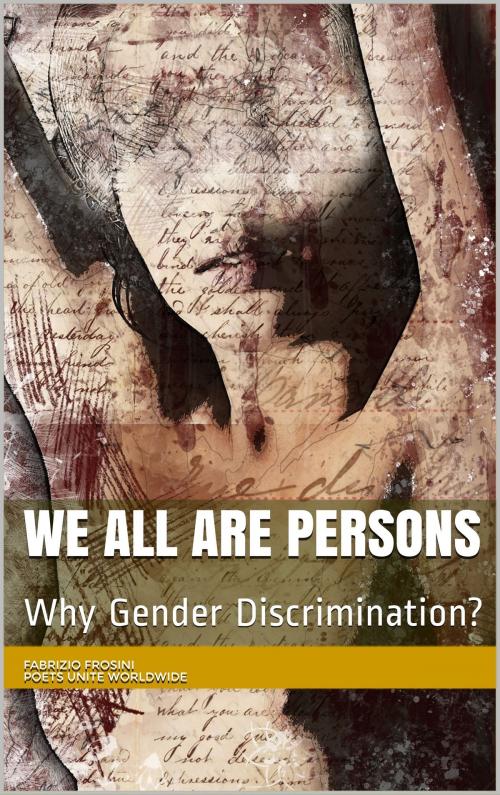| Author: | Fabrizio Frosini, Poets Unite Worldwide | ISBN: | 9781311896551 |
| Publisher: | Fabrizio Frosini | Publication: | June 1, 2017 |
| Imprint: | Smashwords Edition | Language: | English |
| Author: | Fabrizio Frosini, Poets Unite Worldwide |
| ISBN: | 9781311896551 |
| Publisher: | Fabrizio Frosini |
| Publication: | June 1, 2017 |
| Imprint: | Smashwords Edition |
| Language: | English |
One thing that makes 'gender discrimination' such an important issue is that it is a worldwide problem – there's no discrimination on how women are treated as 'second class citizens' in almost all cultures. Every day you would come across stories about atrocities committed against women. Some of such injustices are very overt, like physical and sexual abuse; while others are more 'subtle', like telling women that they are ' goddesses' and ' princesses', and thus, they must not pursue careers in, say armed forces. Misogyny comes in many “flavors”, each of them unacceptable.
However, as a society, we tend to have a very thick skin when it comes to noticing the injustices women suffer. Unless and until it is some really horrible crime like rape and/or murder, we tend to ignore the plight of women. Thus, there is almost no outrage about “small” acts of misogyny – someone is cat calling a woman on the streets? “Honey, take it as a compliment”. Women being forced to wear (or not to wear) certain types of clothes? “My dear, that’s just a part of a culture”. Unfortunately, this attitude, which we often describe as “normal”, later on takes the shape of victim blaming, and a general form of incredulity towards the claims of women about injustices – “Well, she must have provoked him: good girls don’t get raped”.
But, I ask you, do you ever hear someone blaming the victim for other crimes? Do you ever hear a pedestrian getting blamed for being hit by a car? I mean, after all, they were walking on the streets, sort of ‘asking’ to be hit by a car (?!). Nope, it’s only with women that the victims are blamed for the crime.
At the root of this prejudice is a culture that essentially belittles and subjugate women through various "norms" that are born out of obsolete ideals, moralities, and at times even the “Law of the land”. A woman's "femininity" is determined by a patriarchal society, that bullies, torments, at times "destroy" women who do not fall into the "normal" criterion of femininity defined by them. You can look at how women who are not straight are treated in almost all cultures, as such women no longer remain a 'commodity' to be owned by men, but independent identities, with their own "desire".
Any discussion on gender discrimination is incomplete without having a few words on how religions across the globe generally are misogynistic. A point previously made in this ‘note’ about victim blaming has a lot to do with religions and religious morality. The idea that injustices against women happen only when they ‘transgress’ certain ‘boundaries’ set for them, comes heavily from religious scriptures. Even today, in the 21st century, we can easily find a consensus on the religious fundamentalists that women should be blamed and punished for crimes committed against them.
Finally, the representation of women, in media and popular culture too, is at best “problematic”. Rampant sexual objectification, and representation of the “ideal” female body (slim, perfect, flawless) have been argued to have been behind from anorexia to psychological disorders in women.
This gripping compilation of poems by 90 poets from 45 countries, worldwide, is a praiseworthy "collective tale" on gender discrimination. While many readers may well be aware of these issues, for those who might not, I hope this collection will be a starting point, from where they will educate themselves further and contribute to eradicate these injustices. Women are said to be "half of the sky", but it is high time for them to properly own their part. (Souren Mondal, India)
One thing that makes 'gender discrimination' such an important issue is that it is a worldwide problem – there's no discrimination on how women are treated as 'second class citizens' in almost all cultures. Every day you would come across stories about atrocities committed against women. Some of such injustices are very overt, like physical and sexual abuse; while others are more 'subtle', like telling women that they are ' goddesses' and ' princesses', and thus, they must not pursue careers in, say armed forces. Misogyny comes in many “flavors”, each of them unacceptable.
However, as a society, we tend to have a very thick skin when it comes to noticing the injustices women suffer. Unless and until it is some really horrible crime like rape and/or murder, we tend to ignore the plight of women. Thus, there is almost no outrage about “small” acts of misogyny – someone is cat calling a woman on the streets? “Honey, take it as a compliment”. Women being forced to wear (or not to wear) certain types of clothes? “My dear, that’s just a part of a culture”. Unfortunately, this attitude, which we often describe as “normal”, later on takes the shape of victim blaming, and a general form of incredulity towards the claims of women about injustices – “Well, she must have provoked him: good girls don’t get raped”.
But, I ask you, do you ever hear someone blaming the victim for other crimes? Do you ever hear a pedestrian getting blamed for being hit by a car? I mean, after all, they were walking on the streets, sort of ‘asking’ to be hit by a car (?!). Nope, it’s only with women that the victims are blamed for the crime.
At the root of this prejudice is a culture that essentially belittles and subjugate women through various "norms" that are born out of obsolete ideals, moralities, and at times even the “Law of the land”. A woman's "femininity" is determined by a patriarchal society, that bullies, torments, at times "destroy" women who do not fall into the "normal" criterion of femininity defined by them. You can look at how women who are not straight are treated in almost all cultures, as such women no longer remain a 'commodity' to be owned by men, but independent identities, with their own "desire".
Any discussion on gender discrimination is incomplete without having a few words on how religions across the globe generally are misogynistic. A point previously made in this ‘note’ about victim blaming has a lot to do with religions and religious morality. The idea that injustices against women happen only when they ‘transgress’ certain ‘boundaries’ set for them, comes heavily from religious scriptures. Even today, in the 21st century, we can easily find a consensus on the religious fundamentalists that women should be blamed and punished for crimes committed against them.
Finally, the representation of women, in media and popular culture too, is at best “problematic”. Rampant sexual objectification, and representation of the “ideal” female body (slim, perfect, flawless) have been argued to have been behind from anorexia to psychological disorders in women.
This gripping compilation of poems by 90 poets from 45 countries, worldwide, is a praiseworthy "collective tale" on gender discrimination. While many readers may well be aware of these issues, for those who might not, I hope this collection will be a starting point, from where they will educate themselves further and contribute to eradicate these injustices. Women are said to be "half of the sky", but it is high time for them to properly own their part. (Souren Mondal, India)















